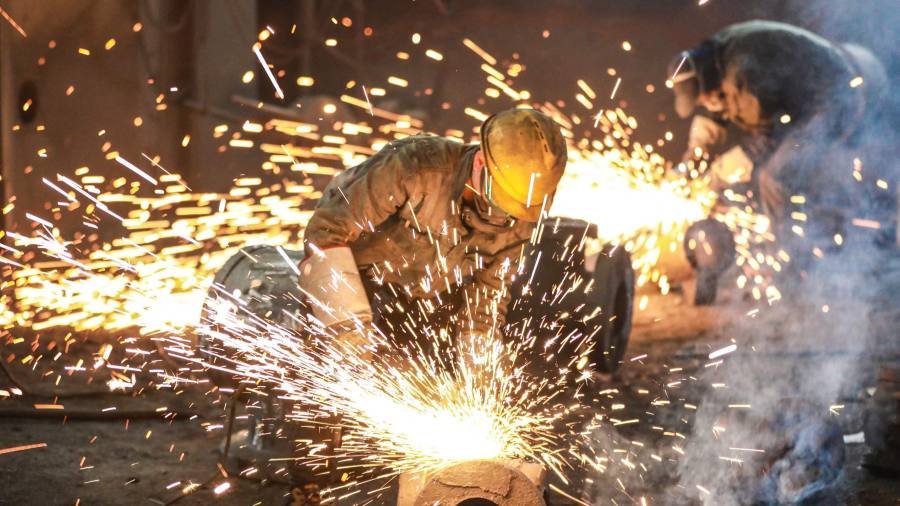EU’s trading partners accuse bloc of protectionism over carbon tax plan

The EU’s trading partners have hit out at the bloc’s plan to introduce the world’s first carbon border tax, saying it is protectionist and puts export industries at risk.
The plan was agreed this week and is set to be finalised this weekend, but several developing nations have already begun to negotiate with Brussels for waivers.
It has also attracted criticism from countries including the US and South Africa, which said that the carbon border adjustment mechanism (CBAM) will unfairly penalise their manufacturers. The measure is set to be the world’s first major import tax on greenhouse gas emissions.
“We are particularly concerned about things like border adjustment taxes, and regulatory requirements that are imposed unilaterally,” Ebrahim Patel, South Africa’s trade minister, told the Financial Times. “If it gets to be an enormous defining thing between north and south, you’re going to have a lot of political resistance.”
“There are a lot of concerns coming from our side about how this is going to impact us and our trade relationship,” US trade representative Katherine Tai said at a conference in Washington this week.
The EU views the CBAM as a core part of its efforts to reach net zero emissions by 2050, arguing that it will simultaneously encourage countries outside the bloc to decarbonise their industrial sectors.
“CBAM is just a way to threaten third countries that they should also update their ambitions when it comes to climate,” said Mohammed Chahim, a Dutch socialist politician who has led negotiations on the law for the European parliament.
A provisional agreement on the CBAM was reached on Tuesday; EU lawmakers are negotiating the final details, including the specific dates for its gradual phase-in, this weekend.
The tax will require importers to buy certificates to cover their emissions based on calculations linked to the EU’s own carbon price. Sectors that will be hit by the tariff are iron, steel, cement, aluminium, fertilisers, hydrogen and electricity generation. A trial period is set to start in October 2023.
The EU plans to expand the scheme to other sectors, including cars and organic chemicals, if it is considered a success.
Before Russia’s invasion of Ukraine, it was set to be the country that was most affected by the CBAM. Russian exports made up the biggest proportion of imports from CBAM-affected sectors, according to an analysis by the Berlin-based think-tank Adelphi based on data for EU imports between 2015 and 2019.
The substantial fall in imports from Russia due to the EU’s sanctions regime and the destruction of Ukrainian industry has since pushed the burden on to other countries.
China makes up around a tenth of CBAM-affected imports, according to Adelphi, with Turkey and India also significantly hit. China has frequently attacked the tariff since it was first proposed in July last year.
In a veiled reference to the measure, the Chinese interim chargé d’affaires in Brussels Wang Hongjian said in September that the EU should avoid “protectionist measures” when it came to climate law. “Green co-operation cannot be promoted in a vacuum,” he added.
Developing nations with less economic heft and no systems in place for measuring emissions were more likely to suffer the most from the introduction of the levy, said Faten Aggad, senior adviser on climate diplomacy at the African Climate Foundation.
“The countries that are most likely to mitigate the risk of CBAM are the ones that already have proper carbon counting,” she said. The result could be a “deindustrialisation” in African nations that export to the EU.
“A lot of these sectors risk losing business unless we pump money into their sustainability and it’s very difficult to rebuild.”
Meanwhile. steelmakers in Brazil are concerned that the CBAM will put domestic producers at risk. Instead of shipping their goods to Europe and facing the tax, exporters might target less protected steel markets, such as South America.
“Our big worry isn’t exports to [Europe],” said Marco Polo de Mello Lopes, executive president of the Instituto Aço Brasil, but rather that more material is diverted to the region, leaving the domestic industry “vulnerable”.
Anger at the measure has been exacerbated by the EU’s insistence that the CBAM will encourage others to decarbonise, while not providing dedicated funds to help poorer countries to invest in clean technologies.
Revenues from the CBAM are intended to go into the EU’s internal budget with a loose commitment to provide climate finance to countries outside the bloc, according to those familiar with the draft text.
A number of countries have already approached the European Commission to request more flexibility in the tariff’s application, according to multiple sources familiar with the discussions.
Baran Bozoğlu, chair of the Climate Change Policy and Research Association, a non-profit research outfit in Ankara, said that it would be “beneficial [for the EU] to provide various incentives, supports and technologies so that the Turkish economy is not adversely affected”.
He added that exporters would have to pay to calculate their carbon emissions and have that validated in order to report to the EU. That they had to cover that cost as well as pay the CBAM was a “great injustice”, he said.
Additional reporting by Andy Bounds in Brussels, David Pilling in London and Michael Pooler in São Paulo
Share this news on your Fb,Twitter and Whatsapp
Times News Express:Latest News Headlines
Times News Express||Health||New York||USA News||Technology||World News